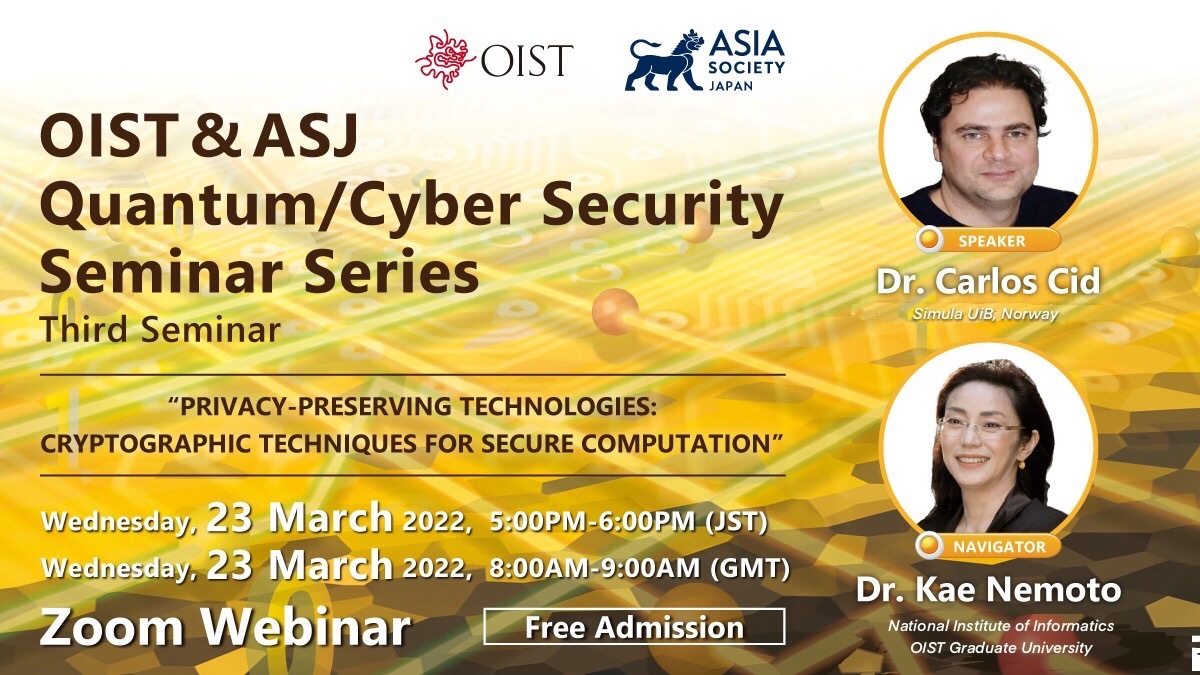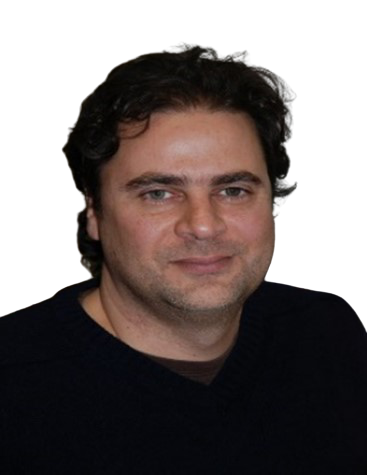WEDNESDAY, 23 MARCH 2022, 5:00P.M.(JST)
[Greenwich Mean Time (GMT): Wednesday, March 23, 2022 8:00A.M.-9:00A.M.]

OIST & ASJ Quantum/Cyber Security Seminar Series -3-
The third seminar was also a great success. A video of this seminar can be viewed here.
"Privacy-Preserving Technologies: cryptographic techniques for secure computation"
The current world is data-driven, with information being continuously collected and processed at increasing levels. Much of this data is sensitive — eg Personally Identifiable Information (PII) or proprietary data — and (big) data security is of growing concern for individuals, companies and regulators. Cryptography has been used for centuries to protect sensitive information, and standard cryptographic techniques can be used for protecting the privacy of data while being transmitted to, and stored at data centres. However due to the increasing added-value in aggregate data processing, for example to compute statistics, in addition to securing sensitive data 'in transit’ and 'at rest’, it has become also important to be able to cryptographically protect data ‘during computation’.
In this talk we discuss the main cryptographic techniques used for secure computation: Secure Multiparty Computation, Homomorphic Encryption and Zero Knowledge Proofs. While the core ideas for these techniques have been known for decades, only more recently have they become sufficiently efficient for practical deployment. This is an area of much contemporary interest and activity in cryptography, and we mention several applications, from secure information sharing to privacy-preserving machine learning. We will also briefly discuss future research directions in the area of secure computation.
Speaker
Dr. Carlos Cid
Director, Simula UiB, Norway *Updated on 3 March 2022
Carlos Cid is a professor in the Information Security Group at Royal Holloway University of London. He is also a visiting research professor at Simula UiB, Norway. Carlos conducts research and teaches on various topics in cyber security. His main research interests and expertise are in symmetric-key cryptology, post-quantum cryptography, secure computation and cyber-economics.
Carlos is part of the submission team of Classic McEliece (following its merge with NTS-KEM), a code-based cryptographic scheme selected as a finalist to NIST’s Post-Quantum Cryptography Standardization Project. He is a co-author of the book “Algebraic Aspects of the Advanced Encryption Standard”, and has over 60 research publications in journals and international conferences in the areas of information security and mathematics.
Carlos holds a BSc and PhD in Mathematics from Universidade de Brasília (1994, 1999). He was a post-doctoral researcher at RWTH-Aachen (2000-2001), and worked as a software engineer in a start-up in Dublin (2001-2003). Carlos joined Royal Holloway in October 2003, initially as post-doctoral researcher. He was awarded an EPSRC Academic Fellowship in 2005, promoted to Reader in 2008, and to full professor in 2014. Carlos was the founding director of Royal Holloway’s Centre for Doctoral Training in Cyber Security, and currently serves as its deputy director. Since June 2018 he also holds a position of visiting research professor at Simula UiB, Norway. In 2017 he received a Guest Researcher award from Japan’s National Institute of Information and Communications Technology (NICT) for a three-month visit to Kyushu University. Carlos is also an experienced cyber security consultant, having worked in the past two decades on a number of projects, mainly in cryptography. *This biography is as of February 2022.
Navigator
Dr. Kae Nemoto
Professor, National Institute of Informatics
OIST Graduate University
Kae Nemoto is a full professor at the National Institute of Information (NII) and the Graduate University for Advanced Studies (SOKENDAI) in Tokyo. She is also the director of the Global Research Center for Quantum Information Science, as well as being the co-director of the Japanese-French Laboratory for Informatics (JFLI). Her research is focused on applications for quantum computers, quantum computer architectures, quantum error correction, quantum networks and the quantum internet. She also leads a newly established academic education consortium "Mastering quantum technology" for the next generation of scientist and engineers in the field. In addition, Kae is one of the founders of the Quantum ICT forum in Japan where she currently serves as the board vice director. Finally, she is a Fellow of both the IoP (UK) and the APS (US).







